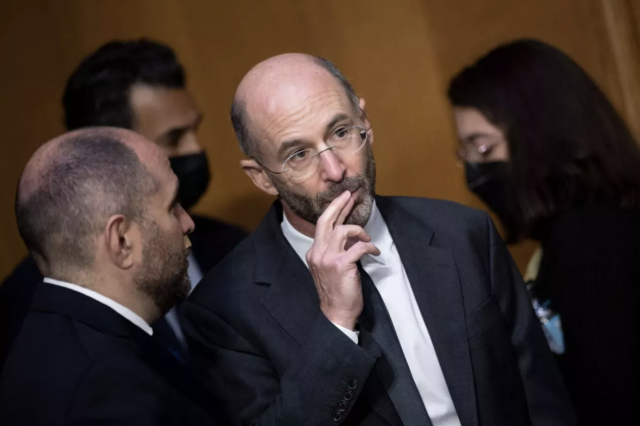
Robert Malley, the man who led the American delegation sitting outside the “Iran talks” in Vienna while American interests were represented inside those talks by the Europeans, Russians, and Chinese, has now thrown in the towel. “You can’t revive a dead corpse,” he has said.
Question: Can you revive a live corpse?
It isn’t a fully sarcastic question. American bribes thrown at Tehran—both for the 2015 Iranian nuclear deal (JCPOA) and the hoped-for-2021 reprisal—were intended to invigorate what was seen by two Democratic administrations as a live, but perhaps comatose, body. It was actually dead then, although the bribes were numerous.
Before the JCPOA, the U.S. had issued warrants for, arrested, tried, and/or convicted a number of Iranians for violations of American export laws regarding high technology or equipment that could have military application. The 2015 deal unfortunately reversed most of that.
Three Iranians were pardoned before trial, and a fourth in the same case had his charges dropped. Three men were released from prison for providing or planning to provide technology: fiber-optic gyroscopes and electron tubes, satellite service, and high-tech industrial parts. Charges were dropped against another man in the case, as well as the company he worked for. Charges against an Iranian accused of shipping lift truck parts, one accused of shipping antennae, and one accused of sending aircraft parts to Iran were also dropped—as were charges against three fugitive defendants wanted in federal court for cases involving alleged export controls or sanctions violations regarding goods headed for Iran.
Iran also got sanctions relief—at minimum, according to then-Secretary of State John Kerry, to the tune of $55 billion in frozen funds, and perhaps as much as $150 billion (as well as an extra $1.3 billion “interest payment” on previously impounded funds).
Ayatollah Ali Khamenei complained about the “high price” Iran paid for sanctions relief, but Mohammad Reza Naqdi, commander of Iran’s Basiji force, bragged, “The annulment of sanctions against Iran’s Bank Sepah and reclaiming of $1.7 billion of Iran’s frozen assets after 36 years showed that the U.S. doesn’t understand anything but the language of force. This money was returned for the freedom of the U.S. sp[ies] and was not related to the [nuclear] negotiations.” Naqdi was referring to the capture of American sailors in the Persian Gulf and the “ransom” we had paid for their release. He received the sincere and fulsome thanks of Secretary Kerry for Iran’s gracious behavior toward the 10 American sailors (whose rights under the Geneva Accords were violated).
For all this, the U.S. got an Iran that cheated on the markers going into the deal, and cheated on the deal from that moment on. President Donald Trump declared the corpse dead, cutting off funds (oxygen) that dropped Iran’s foreign currency reserves—used to fund the regime’s nuclear program, as well as the Houthi rebels, Hezbollah, and various militias in Iraq, among other malign forces.
But, determined to revive the JCPOA, President Joe Biden offered new inducements, beginning with the removal of Iran’s proxy Houthis from the formal list of state-designated terrorist organizations. The administration then ended support for Saudi Arabia in the Yemeni war, and removed Patriot missiles from Saudi Arabia and the United Arab Emirates. South Korea was pressed to release frozen Iranian funds. Sanctions were waived for those who bought Iranian oil—(namely, China) and electricity (namely, Iraq). The Abraham Accords between Israel and numerous Islamic countries were downgraded, and U.S. support, previously pledged to the EastMed pipeline consortium of Israel, Greece, Cyprus, and other European countries, was withdrawn.
The result was a rise in Iranian foreign currency reserves from about $10 billion to $137 billion, and a series of cheats on its commitments that even the IAEA couldn’t ignore. In July 2022, after finding uranium traces at three undeclared nuclear sites, the IAEA passed a resolution that expressed “profound concern” that the traces remain unexplained “due to insufficient cooperation by Iran.” In response, Iran took down 27 monitoring cameras the IAEA had installed, subject to the JCPOA, and began installing advanced IR-6 centrifuges at its Natanz and Fordow sites.
IAEA Director General Rafael Grossi warned that the move posed a “threat to the agency’s continuity of knowledge” and could deal a “fatal blow” to efforts to revive the deal. Or the corpse.
And, finally, perhaps Iranian determination to carry out both its conventional and nuclear policies have, indeed, killed the dead corpse. Just perhaps.





